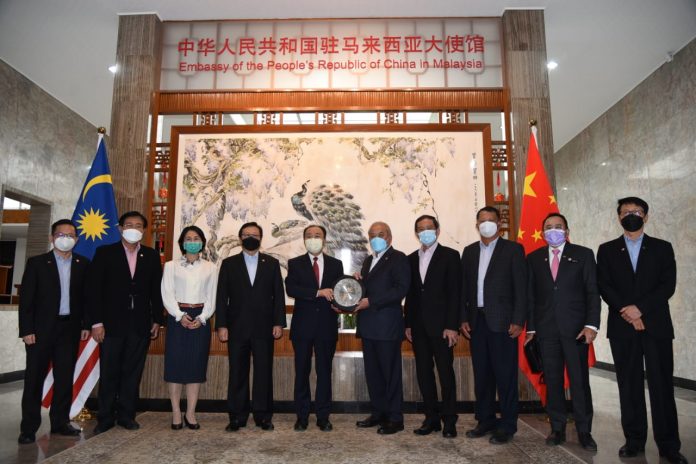KUALA LUMPUR: Chinese Ambassador to Malaysia Ouyang Yujing has promised to look into the request of the Federation of Chinese Associations Malaysia (Huazong) for a Chinese consulate to be set up in Johor Bahru.
He promised this in response to a request by Huazong President, Tan Sri T.C Goh, during a courtesy call by Huazong leadership led by Goh, on Saturday.
The said proposal was among the many proposals made during the two-hour long discussion held during the courtesy call. Also in attendance were, Ma Cuihong, the Minister-Counsellor of China Embassy in Malaysia, and its First-Secretary, Wang Zhimin, Huazong Deputy President, Dato’ Ong Seng Khek, Vice President, Dato’ Lam Kuang Yau, Treasurer-general, Tan Sri Tan kean Soon, deputy Secretary-general, Yong Yew Wei, Jason Tiu Meng Seng, President of Melaka Chinese Assembly Hall, and Central Committee members, Dato’ Ng Chin Heng and Dato’ Lee Teck Hua.
Goh said, with the Covid-19 pandemic situation in Malaysia recovering gradually, bilateral trade and communications between Malaysia and China too has been on the rise. It is thus hoped that the Chinese government could consider such a proposal.
He was convinced that if it materialised, it would help to better promote bilateral relations between the two nations in various sectors. Currently, besides the Chinese Embassy in Kuala Lumpur, there are three Chinese consulates in Malaysia i.e. in Penang, Kota Kinabalu and Kuching.
While promising to look into the said proposal, Ouyang said he will have to conduct a thorough study on the actual need for such a set up, as well to take into consideration other relevant factors.
Goh who is also President of the Federation of Chinese Associations Sabah (FCAS) also opined that through the Regional Comprehensive Economic Partnership (RCEP) initiative, Sabah with its strategic position could play a significant role as a base or transit hub for China’s agriculture products.
He also acknowledged that Malaysia was the first ASEAN nation to establish diplomatic ties with China 47 years ago, and the two nations had since forged cordial and strong bilateral relations and cooperation in all fronts, even despite Malaysia having had change of governments and prime ministers thrice, since the 2018 general elections. This is also in line with Malaysia’s official stand of supporting the ‘One China Policy’, which is also Huazong’s stand.
He went on to note that diplomatic ties between the two nations were further elevated into “full strategic partnership” level, following the official visit by China President Xi Jinping to Malaysia, in 2013.
“Ever since then, bilateral trade between Malaysia and China has exceeded USD 100 billion, and it continues to remain so in the last eight years, even despite the devastating impact of the Covid-19 pandemic. Last year, the bilateral trade between Malaysia and China was amounting to USD 131.16 billion, and it recorded USD 81.79 billion for the first half of this year, an increase of 43.9% as compared to the same period of last year.
“Hence, we are confident that the bilateral trade figures for this year too are very likely to exceed USD 100 billion,” said Goh.
He also acknowledged that China has remained Malaysia’s biggest trading partner for the last 12 consecutive years, besides being the biggest foreign investor for Malaysia’s manufacturing sector; Malaysia is currently the 9th biggest trading partner for China in the world, and the second largest among ASEAN countries.
He was also convinced that, with the Covid-19 pandemic coming under better control, and Malaysia is gradually heading towards economic recovery, coupled with the ramping up of the RCEP and Belt-and-Road initiatives spearheaded by China, bilateral trade between Malaysia and China will be further enhanced and elevated to the next level.
On behalf of Huazong, Goh also highly commended Ouyang’s leadership and dedication towards forging closer and stronger bilateral ties between Malaysia and China, since he took over the office, in the past one year.
He believed with his vast experiences and strong capability, Ouyang would be able to bring such strong diplomatic ties between the two nations to the next level.
He assured that Huazong and all the Chinese assembly halls in Malaysia would continue to give their full support and cooperation to the Chinese embassy and consulates in this aspect.
He also extended his invitation to Ouyang and his colleagues to visit Huazong and the Malaysian Chinese Museum, as well as to conduct a nationwide tour to visit the Chinese assembly hall in every state, when the Covid-19 situation is better under control.
Meanwhile, in his comments, Ouyang among others recognized the sheer conviction, perseverance and huge contributions of the Malaysian Chinese community towards the preservation and development of Chinese education in the country. In recognition of this, the Embassy has been providing education grants to Malaysian students of various races, under its scholarship programme, each year.
He also paid tribute to the contributions made by the overseas Chinese community, including those in Malaysia, to China, during the Second World War period, and the early stage of China’s reform and opening to the world.
He continued that today, China is no longer just a developed agricultural nation but also a technologically advanced nation, with significant GDP growth every year, and that its rapid and peaceful rise would bring development and prosperity to the world.
Besides this, he also recognized the significant role and position of Huazong in the Chinese community, as well as its full support and cooperation to the China Embassy in Malaysia, all these years.
He promised that the Embassy would continue to give its support and close cooperation to Huazong, its activities and programmes included.
Meanwhile, in his comments, Ong said the Malaysian government should study and emulate the Chinese government’s successful approach in tackling the issue of Xinjiang Muslim community, to better improve the relations between the Muslims and non Muslims in Malaysia.
Tiu meanwhile raised the issues facing Malaysian students who are studying in China, and hoped that the China Embassy could pay attention and to help resolve the issues.


